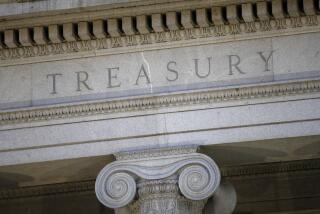Banks Wearing Blinders
- Share via
Leading an international drive to stamp out money laundering, Washington now has to face up to an embarrassing finding in a yearlong Senate study--that a big part of the problem is rooted in the United States. U.S. banks, it turns out, serve as major conduits for illicit money from drug traffickers, illegal gambling, gunrunners and corrupt officials.
Law enforcement officials and bank regulators agree that, despite reams of laws, regulations and voluntary guidelines, money laundering thrives. The banks themselves can and should do more to make life difficult for the criminals. Tougher enforcement of existing laws is part of the solution, but regulators should also try an approach that has produced impressive results elsewhere--shaming banks into compliance by publishing the names of those with lax controls on laundering. The public rarely hears the details of money laundering unless there’s a Page 1 scandal such as the Bank of New York’s role in helping Russian organized crime hide $7 billion.
By some estimates money laundering is a $1.5-trillion-a-year operation and a foundation of the criminal underworld. Some of the best-known U.S. banks, including Bank of America and Chase Manhattan, have such weak controls that they have become unwitting links in the scheme. Through correspondent banking--moving funds around the world--they often deal with bogus financial institutions that are little more than post office boxes in offshore tax havens.
There are plenty of laws and directives to combat the practice. Financial institutions are required to keep track of large transactions and report suspicious activity. U.S. Treasury and international guidelines tell banks what to look for, and some of the world’s largest banks have adopted a voluntary code. Bank regulators themselves receive detailed guidelines from the Bank for International Settlements on how to ensure that banks under their control are not used by criminals.
Enforcement is the weak link. The Treasury’s Financial Crimes Enforcement Network lists on its Web site only 13 cases over a period dating to April 1999, mostly involving paperwork violations by casinos and small financial institutions. The Treasury must step up enforcement if it wants the laws obeyed.
Moreover, it should take as an example the Financial Action Task Force, the Paris-based organization set up to tackle global money laundering. The task force last June published a blacklist of 15 countries that failed to enact laws against money laundering. They included Israel, Russia and several Caribbean countries. The governments were so red-faced that 11 of them have already enacted all or some of the requisite laws. The Treasury should consider blacklisting all “noncooperating” banks. This would hit them where it hurts most--their reputations.
More to Read
Sign up for Essential California
The most important California stories and recommendations in your inbox every morning.
You may occasionally receive promotional content from the Los Angeles Times.













